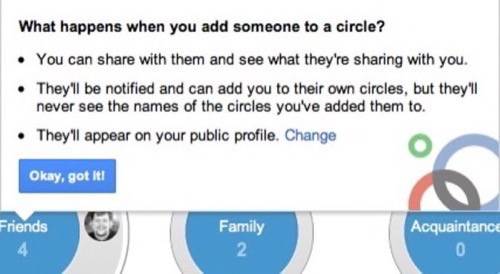There are now over 3,000 people in a circle I’ve dubbed “work friends.” That may be nothing compared to the likes of Robert Scoble, but at the current rate of friending occurring on Google’s new social network, I’m well on my way to seeing friend counts that rival Twitter, a network where I’m hovering around 12,000 followers. And this is during Google Plus’ private trial period!

The beauty of Google’s Circles is that it does allow for this sort of public relationship with people in your industry – in my case, fellow tech enthusiasts. But at some point, I’m concerned the “put people into boxes” model may break down. Relationships aren’t binary (friend or not), but they’re also not static (e.g. “Friend A in Circle X”). Relationships change. How will Circles adapt to change with them?
2 Examples of Changing Relationships
Here’s one simple example to illustrate the problem with Circles: you change jobs. Let’s say you go to work for a competitor. Now, everyone in the circle called “Work” need to be put into a circle with less access to your daily thoughts and posts, assuming you were using Google Plus to talk about projects you’re working on or you were talking to others in your same industry. Those conversations may need to remain private.
Even if privacy is not a concern, for organizational purposes alone, the title “Work” is no longer accurate.

Here’s another example: you become friends with someone – real friends, not “Internet friends.” Thanks more public social networks like Twitter or even niche communities like “People You Follow” on Google Reader, there’s now an opportunity to know of someone, even chat casually with them in a safe, public, space. With Circles, you can easily dump all these same folks into one big Circle. From my initial foray into Google Plus, that’s precisely what many of the early adopters have done. They’re using Google Plus the way they used Google Buzz, or FriendFeed before that. Friend everyone, and engage in public chats – mostly about Google Plus, of course.
But what about when one of those people becomes a real-world friend? Maybe you first run into them at a conference, putting a face to a name. They’re now an “Acquaintance.” Later, you spend a night out on the town with them, and realize you have a lot in common. You make plans to see each other again, at a non-work event, perhaps. This person has become a “Friend.” Depending on how your Google Circles are set up, you may have had to drag-and-drop them into multiple different circles over time, as this relationship changes.

Be Prepared: Circle Management Overhead Coming Soon
No big deal, you say – it’s just one person. But are you prepared to do that with all your relationships, from this point forward? Is that a sustainable system? How much of your time with Google Plus will be spent organizing and quantifying your degrees of closeness with your contacts? And if you choose not to, deciding to just friend only your “real” friends, or “return friend” everyone, then how exactly would Google Plus’s system be any different from Facebook or Twitter (respectively) for you, in terms of relationship management?
These are some of my initial concerns with the Circles model of managing relationships. It’s not a system I personally mind, to be fair – I’m a geek too, and I like organizing things. But what about the mainstream user, arriving from Facebook? Circles are a lot like Facebook’s friend lists, a feature which Facebook has shown less support for and interest in over time. Maybe regular folks don’t think it’s useful to put people in lists? Maybe regular folks find it easier to live in public, and post things for everyone to see, even if “everyone” now includes mom and dad, grandma and grandpa, and that random friend from high school who wanted to catch up?
What Can Google Do?
To continually differentiate itself from Facebook, and keep Circles from becoming an organizational overhead nightmare, Google Plus needs to get smarter, quickly. Google should use its engineering brilliance to build algorithms that do relationship management for you. It should know when you change jobs (you update LinkedIn, for example) and suggest or enact a Circles change to reflect that. It could monitor the frequency of your conversations with fellow friends and suggest they’re moved into a more personal circle – all you have to do is click “Accept.” Or it could even auto-create Circles for you based on those interactions, or based on keywords in Google Profiles, or based on whether or not you were friends on other networks, and so on.
But should Google intervene? Or would that cross the “creepy line” it so likes to toe? And if it does not intervene, will Circles become end up being too much work to keep up with, thereby destroying the entire value proposition of Why Google Plus and Not Facebook?
What do you think? Do you share this concern, or find me overly pessimistic? Let me know your thoughts via comments, Twitter, or heck, Google Plus.










